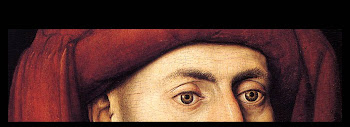
Interesting. I picked up a "fluff" magazine at the newsstand yesterday, just for kicks. (Time, September 3d issue). I hadn't read anything so gauche as a popular magazine for, I don't know, about a year, and so I was surprised to find out how the popular zeitgeist had shifted (um, I don't see much TV either). At any rate, I found a surprising theme running through the articles: a somber, serious mood, diffuse with a stolid determination.
The Terrible Secret
The Terrible Secret
The lead article purported to reveal the "secret" life of Mother Teresa of Calcutta (remember her?). The upshot was that despite her public and frequent exhortations to live a spiritual life full of the joy and fulfillment that comes from service to others, Mother Teresa suffered from a half-century of nearly unbroken spiritual emptiness, doubt, emotional dryness, and longing. Tellingly, this cognitive dissonance between her message and ubiquitous smile and her inner torture was something she was fully aware of--she wanted her personal correspondence to be destroyed lest her possible hypocrisy (she used the word) damage her mission.
In Praise of Angst
In Praise of Angst
At any rate, what interested the article's author was not so much the inner-turmoil of an Armenian nun, as the determination and consistency of this remarkable figure. What interested me is the unabashed, yet reserved, praise that the author had for this unwavering commitment to her work in the face of what was apparently for her a source of constant and intense pain. Since when does the popular press praise a lifestyle that causes and sustains personal pain as something healthy, valuable, laudable?
The Few, The Proud, the Dour
The Few, The Proud, the Dour
Next, the editor threw in a piece about the 2008 Presidential hopefuls. Again, they each appear to be competing for the prize of "the guy or gal best looking in a dour blue suit." Giuliani's claim on the big chair appears to be his Mother Teresa-like "smile in the face of adversity". Clinton's appeal, if charismatic, is definitely as un-huggable as one can imagine (although she tries). The rest appear to be stumping on a platform of claimed competence and experience--not the "I feel your pain" warmth of Bill's 1996 victory over then-too-dour Bob.
No More Tears
No More Tears
The capstone of the article is a one-page editorial by Michael Elliott on the "Diana effect." The gist of the article is that while the aristocrat's 1996 death lead to a very '90s-style outpouring of un-self-conscious and heart-felt emotion, 2007 Britain, and perhaps most of the Western world, is, conversely, in a far more "stiff-upper-lip"-ish mode. Tellingly, Elliott is neither surprised nor put off by this; rather, he embraces it. His final words? "You can't fuel a society on flowers alone." If that isn't the antithesis of the 20th-Century version of the "gay '90s" of the prior century, I don't know what is.
We Get to Fit in Now?
We Get to Fit in Now?
Perhaps, then, we as a profession may find ourselves for once in a half-century not at odds with the popular "world feeling." After fifty years of overt hedonism, rebellion, exaltation of emotion, destruction of traditional mores and embrace of the material, the indulgent and the weepy, we as lawyers may actually be on track. Perhaps our temperament as cautious, cynical, careful and perfectionist may finally have found a voice that is not dissonant with our non-lawyer acquaintances. Will we now fit in? And if we do, is this a "good" thing? It remains to be seen.

